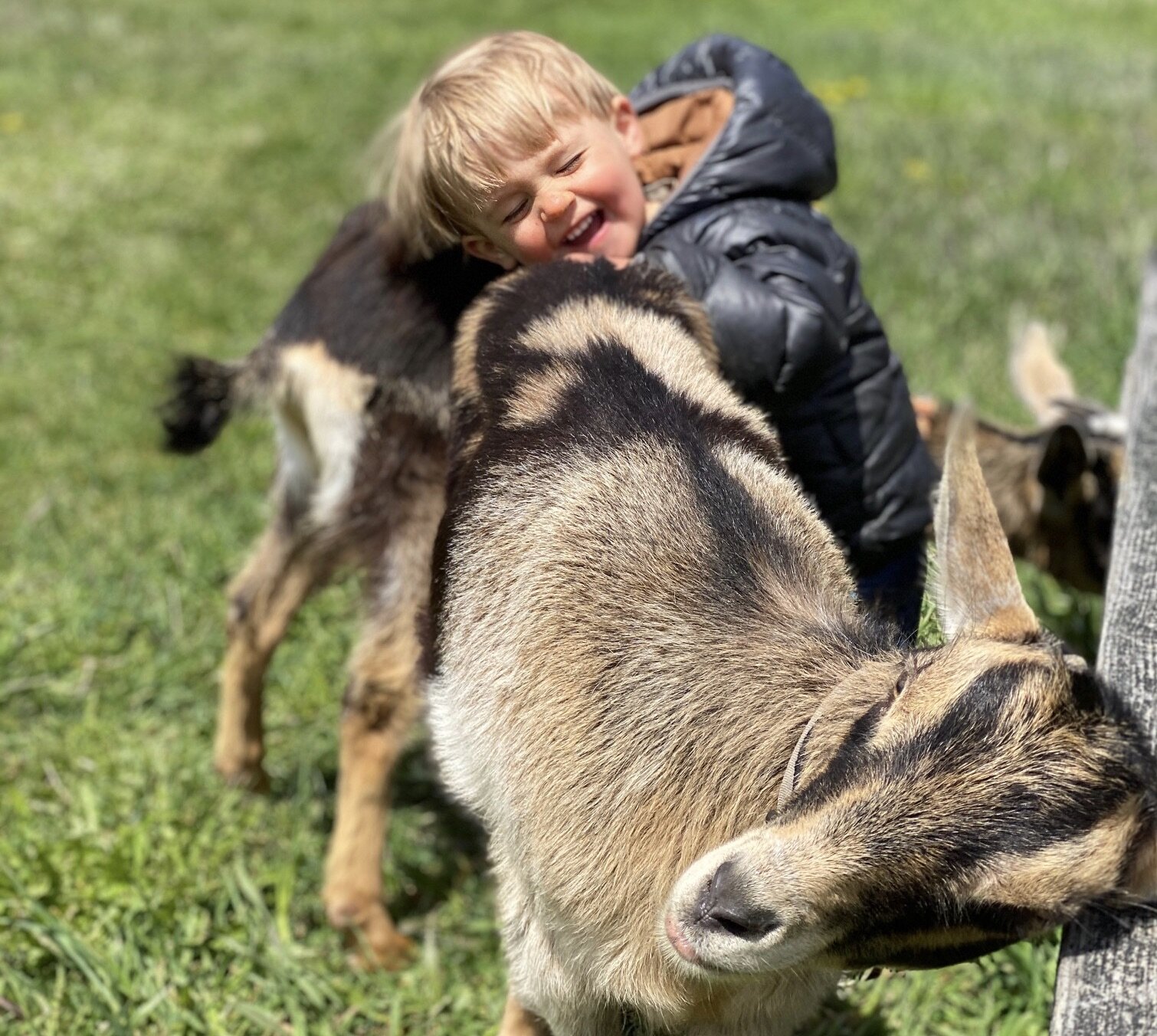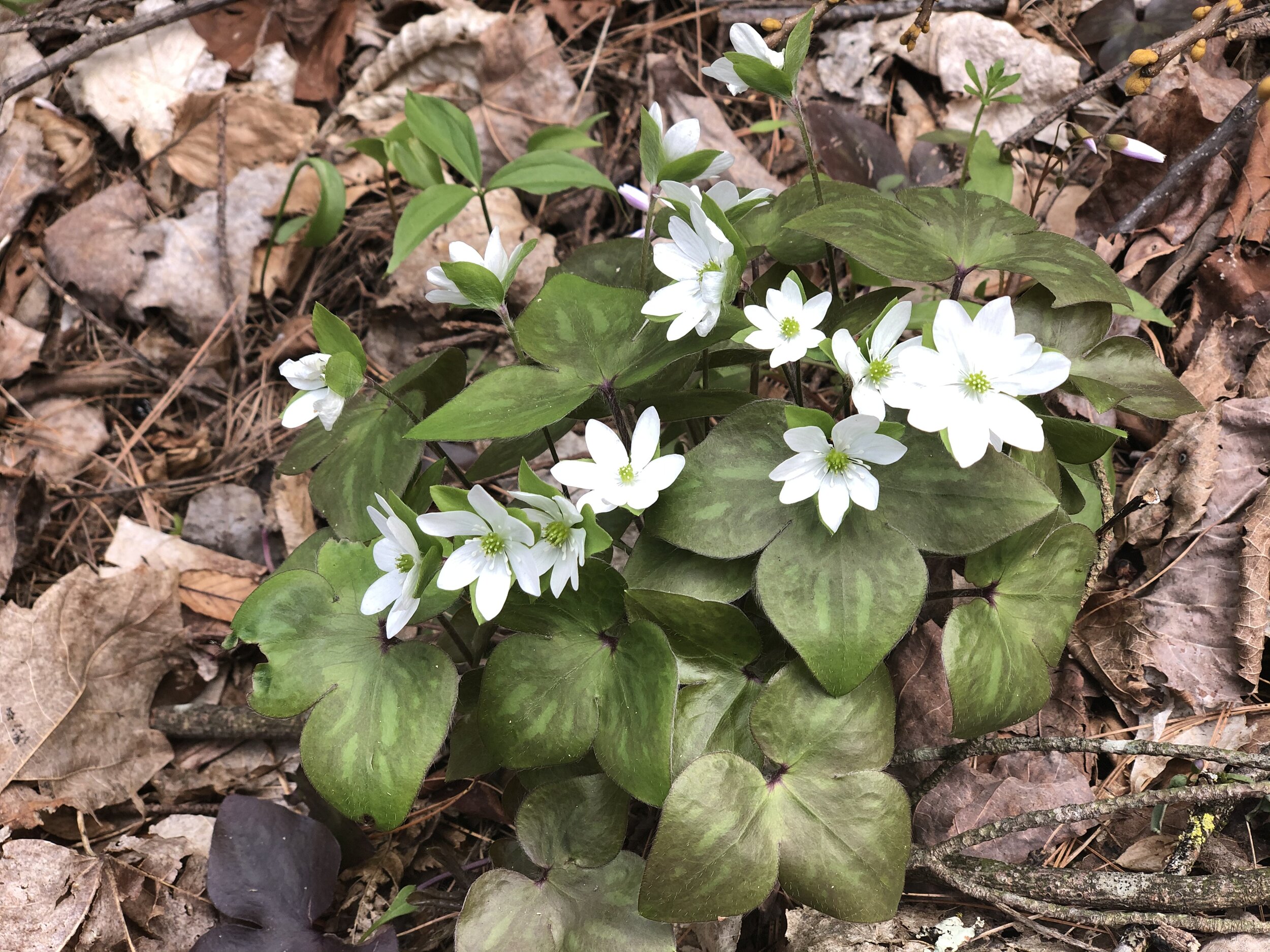Grandson Jack and his goats at the Farm
It is Memorial Day weekend and we have all been in lockdown for ten weeks. The town of Middlebury is usually bustling during these days as it is the traditional time for graduation. The town and the campus are quiet and almost empty. Times like these feel especially sad and lonely. My heart goes out to all the graduates everywhere who are not able to be with friends and family and celebrate their hard work and accomplishments together.
Instead of attending a Memorial Day parade this morning, I dropped off four dozen cookies at Bread Loaf Mountain Zen Community. This community delivers bag lunches twice a week for the homeless in Rutland. We make cookies and write notes of kindness so that we can contribute in some small way to brightening someone’s day. I don’t make cookies as a rule, but now I am trying different recipes and learning how to make a good, firm, not burnt on the bottom, cookie as an offering. It is a weekly practice.
Hypatica, found during a spring walk in the woods
I have found that there are other practices that I have put into place and honored because I realize that they serve me and that they serve the common good. I go to bed early, I wake early. I start my day reading something inspiring and uplifting. I begin by finding peace and centering with my breath in meditation. I take care of our land, I plant, I weed. I write daily. I follow a drawing prompt that an artist friend offers every day to an open group where we share our efforts weekly. We connect with dear family and friends virtually. We keep in touch with the schools that we work with through virtual meetings and coaching sessions as we have done since we launched Cadwell Collaborative in 2008. We read to our grandchildren in Boston and also share virtual drawing sessions with them. We take care of our 18-month-old grandson Jack every Thursday so his mom and dad can work virtually. I bake bread, even sour dough bread, and it is delicious. It took me a while to figure out how, but with the help of friends and my son, Alden, I did it and it is so satisfying. I give loaves as gifts, following the example of a neighbor. I walk, often in the woods, and sometimes with a friend at a 6-foot distance. Life has become simplified, pared down to the most basic themes of tending, helping, moving, learning, loving, practicing, savoring, and living in the present.
Exploring the Farm on Thursdays with Jack and the goats
I have felt so grateful for our family’s grounding in mindfulness from our shared retreats with Vietnamese Buddhist monk, Thich Nhat Hanh. Because we have practiced for years, it feels natural to turn to practical wisdom and to seek out other opportunities to grow more solid and settled. As my friend Olivia Hoblitzelle says, there is a virtual candy store of options for retreats, courses, and talks out there in the on-line world. A few weeks ago, I joined a five-day retreat with Sharon Salzberg and Joseph Goldstein sponsored by the Insight Meditation Society in Barre, Massachusetts. I have listened to the recordings of their talks several times each and am still learning new things and perspectives. This week, Jack Kornfield is offering an online class. Many of these offerings are free or cost very little. They are sustaining and calming, and practical! Hard to imagine that meditation could be described as practical, but right now especially, it is.
Flower bouquets for friends and neighbors
We are selective because there are also so many podcasts, broadcasts, and blogs, all focused on helping us navigate this Covid-19 world. I find, though, that focusing on this kind of input rather than too much news or social media is life sustaining rather than depressing, draining, and sad.
One of our favorites is watching poet Billy Collins live in the evening. He reads his poetry and others’ poetry as well. Jen Hoffman writes inspiring and hopeful blog posts. I just discovered that Brene’ Brown has a podcast called Unlocking Us and I listened to one of her first episodes today which I found helpful. Dan Harris hosts his Ten Percent Happier podcast, now with every episode aimed at helping us cope and even thrive during this time.
If you subscribe to the New York Times, you can receive a compelation of articles and resources called Well in your inbox. Psychology Today has many articles that are to the point, and helpful.
I will conclude with one of the Psychology Today articles written by my friend mentioned earlier, Olivia Hoblitzelle, whose article references the title of this blog post. When I read it, I sent it out to friends and now have it tacked on the door of my closet to revisit often. All very wise guidelines for the times that we are in.
I count our blessings every day...to live where we do, to be a part of an extended, loving family, to have work that we love, to be able to find ways to cultivate peace and kindness. May we each offer whatever we can to our communities and to the larger world where there is so much grief and hardship. And may we all find ways to take good care of ourselves.
As Olivia ends her piece, I will close as well,
Take Care, Stay Well, and Many Blessings
Louise and Ashley
One of the daily drawing prompts: Animals
Wisdom for a Pandemic: Seven Guidelines for Living during Turbulent Times
Olivia Ames Hoblitzelle
“This pandemic is utterly mind and soul-boggling. How do we even begin to live in such cataclysmic times? ” This statement from a friend prompted me to reflect on how we might respond to the enormity of what’s unfolding around us.
The Greek dramatist Aeschylus wrote: “Especially in times of darkness, that is the time to love, that an act of love might tip the scale.” While still being realistic, I find myself wanting to cultivate some positive perspectives for living during these challenging days.
1) Create pauses. Whatever you’re doing throughout the day, wherever you are, simply stop, pause, and close your eyes. Turn within for some slow, deep breaths, affirming that this moment, this breath, is what you’ve been given. Everything may be unraveling in the outer world, but you are held in the benevolence of your own breath and the momentary quiet. This way you can create moments of refuge throughout your day.
2) Reach out. Never before have we been so aware of our interconnected- ness with the whole world. This recognition may feel both overwhelming and strangely comforting: we’re all in this together. We may be temporarily limited by “social distancing,” but we can still reach out to loved ones by electronic means, through phone, email, Facetime, Skype, and Zoom. Or write a note to an elder who lives alone and would rejoice in your small act of kindness.
“An act of love might tip the scale.”
3) Working with fear. In addition to the corona virus, there is a secondary pandemic of anxiety and fear. We can take care of ourselves and those around us by addressing our fear and help others to do so as well.
Start with a “welcoming practice,” a four-step process for working with fear:
a) Fear always starts as energy in the body. Although it seems counter intuitive, we need to open to the fear, feel it fully, and allow it to run its course. If we can stay with the cascade of feelings, they will diminish, because the less one resists, the faster that will happen.
b) Bring awareness to your breath, that ever-present ally. Deepen your breaths. Breathe into your belly to activate the parasympathethic nervous system and lower your blood pressure. Imagine the fear flowing out with your out breaths. Fear creates contraction in the body, whereas breathing through the sensations will invite softening and a sense of greater ease.
c) Repeat a mantra or short prayer on the outbreath. For example, “let go,” “calm ... ease,” “quiet mind,” “peaceful heart.” Feel deeply the meaning of whatever words you choose.
d) Expand your field of awareness to include others who may be experiencing fear too – a family member, friend, or even all beings.
Tune into this vast field of interconnectedness. Imagine that you are breathing with them and extend loving kindness to them. “May you be free of fear and have ease of heart.”
Every time you turn your attention away from yourself toward others, your heart will feel lighter. Whatever ways you find for working with fear, appreciate that it calls for self-acceptance, kindness, and great courage.
4) Seek solace in nature. Become aware of what distracts you and throws you off balance -- perhaps an overdose of news programs, too much time on your phone, countless hours at the computer. Go outside and open to the natural world. Look up at the sky and notice the cloud patterns, see what has changed in the tree outside your apartment, walk in the nearby park. Breathe deeply! Yesterday, I heard the chipping sparrows hiding in the hedge, singing their hearts out. Then a display of snowdrops in my neighbor’s yard -- gifts from the natural world, reminders that at some level all is well.
5) Live in the present moment. In spite of this familiar exhortation, our minds are often lost in the past or future. In the words of Thich Nhat Hanh, a beloved Buddhist teacher, “The future is being made out of the present, so the best way to take care of the future is to take care of the present moment.”
Don’t shrug this off as one more platitude! Really notice and bring awareness to whether or not you are fully living in this precious moment – the only one you have.
6) Cultivate calm. The simplest steps are often the most overlooked, or the hardest. Since we know how interconnected we are in subtle ways, it is truly a gift to yourself and others to cultivate calm. We can start to do that through the steps mentioned here. Be still. Be calm. Beneath the turbulent waves of this storm, we can always find the calm that lies deep beneath the surface appearance of things. That calm is within.
7) Living with the unknown. The fact is we’ve always been living with the unknown, but probably we’ve never given it serious thought. The enormity of this pandemic thrusts this reality into our consciousness. In these turbulent days, we have a choice: we can slip into a sea of anxiety and fear, or we can look into the face of reality and accept the unknown as a natural part of life. We can rejoice in the day we’ve been given and live it as consciously and lovingly as we can.
A wise one once said, “Fear creates the abyss; love crosses it.”
I’ve always loved this statement, an invitation to open to the love in our lives. Who can we reach out to? What kind gesture might we make toward a neighbor? How might our cultivating calm be a gift to others? Our act of love might tip the scale.
Take care, stay well, and many blessings, Olivia
The land that we call The Farm, where Ashley grew up






